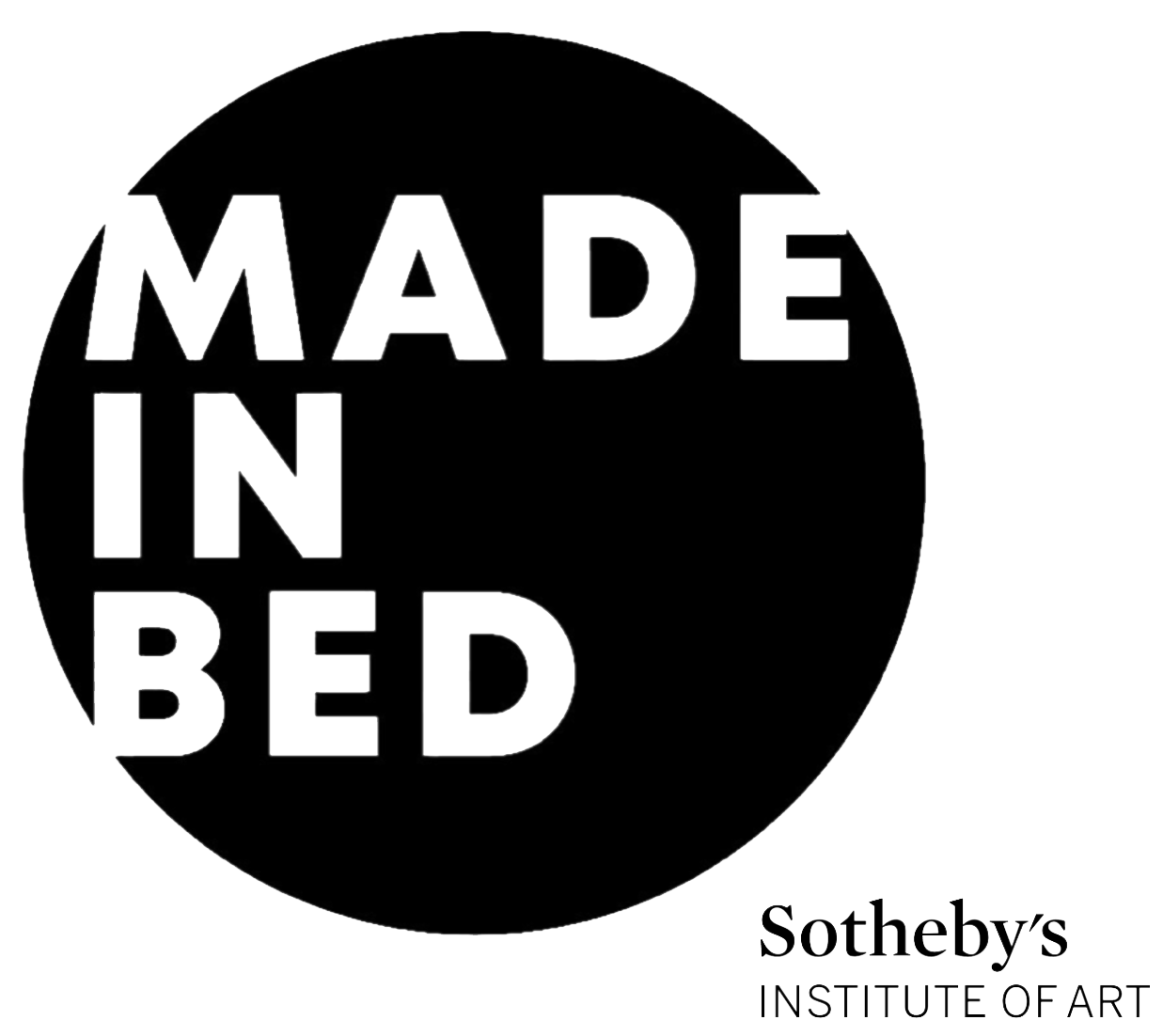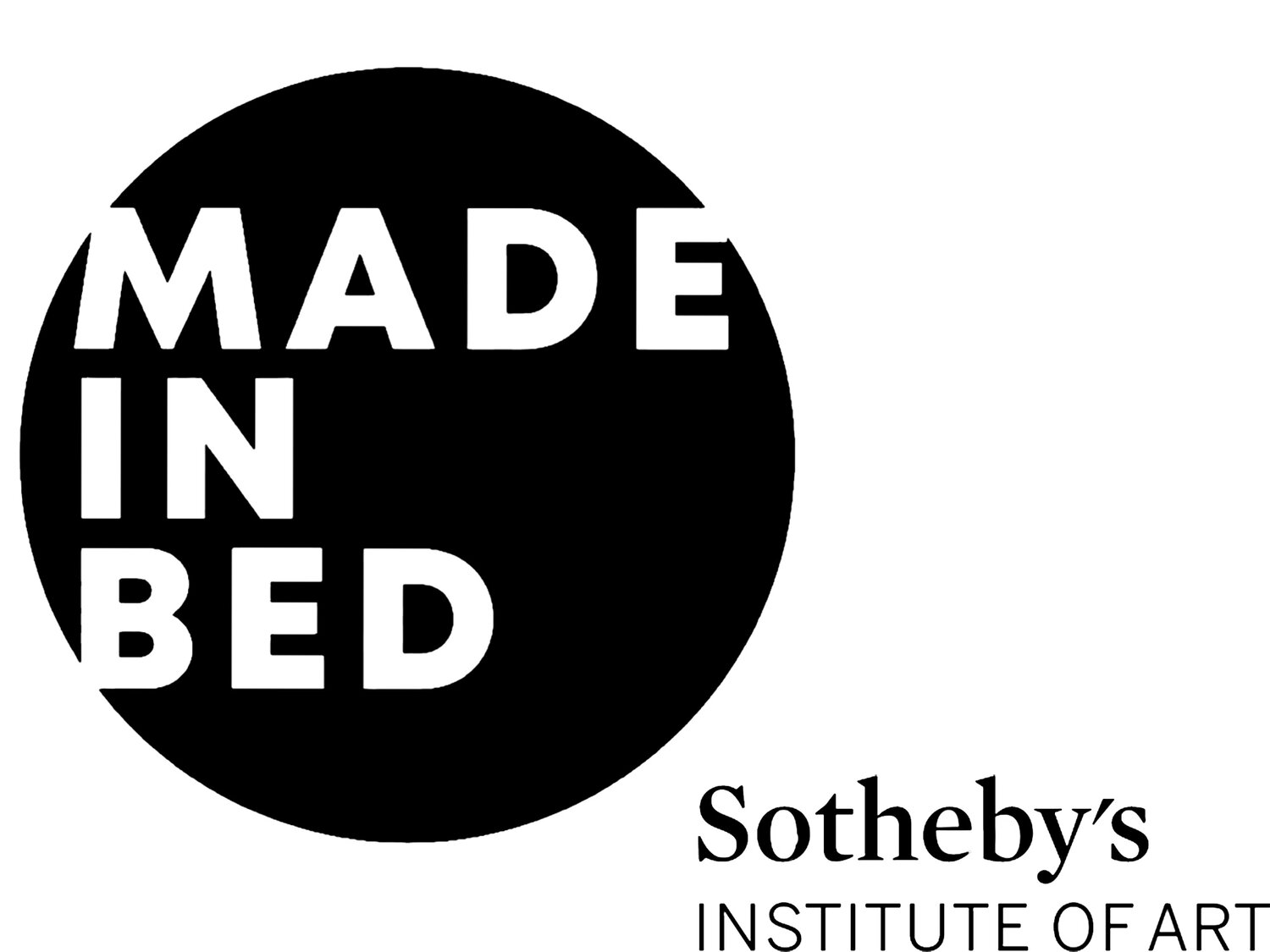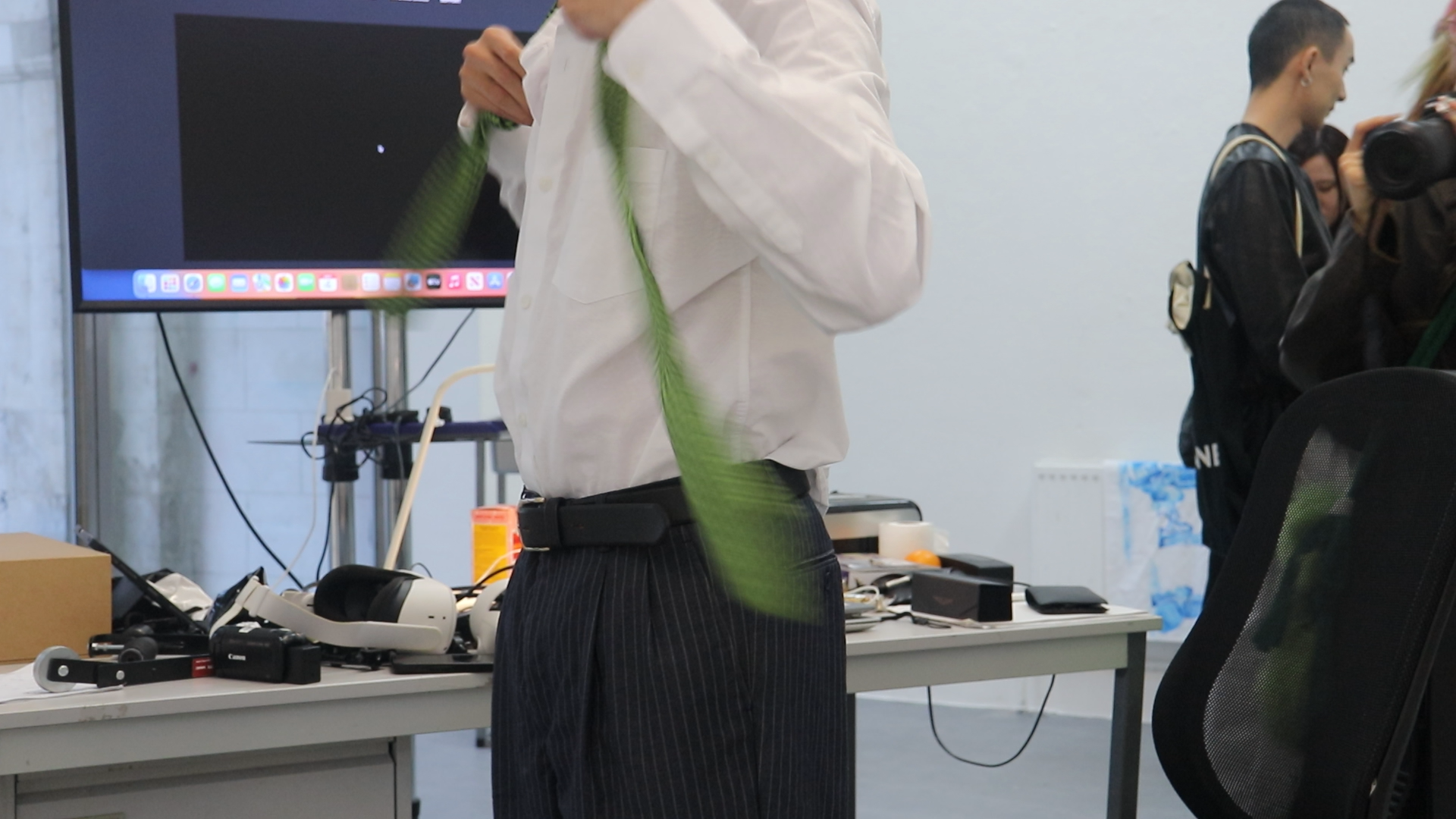Maya Kil in Conversation with Artist Karl Xinghao Liang
Karl Xinghao Liang (born 1999 in Beihai, China) is an artist living and working in London and Shanghai. He studied at the China Academy of Art (2017-2021) and Chelsea College of Art in London (2022-23). The artist uses painting as a starting point for his work. After 2022 Karl Xinghao Liang expanded his practice into installation, performance, monolithic art, graphic design, music, and video to name a few. Xinghao Liang explores the possibilities of new digital technologies, emphasizing their reverse control and growth catalysis of biological flesh, spirituality, lifestyle, and politics.[1] On October 4th, 2023 Karl Xinghao Liang presented his first performance piece in front of a live audience - I Can’t Fish But I Am A Good Fisherman.
Karl Xinghao Liang, I Can’t Fish But I Am A Good Fisherman (2023) Photo Courtesy: Liang Xinghao.
“I entered a gallery space set up in my suit: there are my usual desk and chair, the clutter from my desk: some books, pill bottles, food, a lamp, a laptop and a VR set with a large monitor attached to the device. I went to my desk, took off all my clothes and stuffed them into a desk drawer, put on my VR glasses and took control of my character in the game, changed the character from a virtual suit to a very flashy outfit and started playing a game called “VR fishing”. In this game, I travelled to a beautiful beach in Korea and started fishing. I caught 6 fish in less than 20 minutes, then I changed back into the suit in the virtual and closed the game, and I started to put the suit back on in the real world and left. [2]”
Maya Kil: Considering your visual arts background, which part of your previous artistic practice led you to do performance art?
Karl Xinghao Liang: About two years ago, I graduated China Academy of Arts as a printmaker and my main practice was painting. In fact it was the only medium I knew. But this medium also limited me because reproducibility and metaphor are the most important part for an image when for another medium, like video or performance it could be something else- It can be some kind of relationship with the viewer or some kind of fleeting nirvana. And that is why I started learning to do something in other mediums.
I have then decided to focus on the relationship between human beings and technology. During the Covid pandemic in China, while I was still focused on painting, under the strict lockdown policy I was locked in my house, staring at my works. This is when I have created a project involving fake news from social media. Covid caused not only tragedy but panic; and panic fuels the spread of information - real or false. For example, I saw something about Watermelons curing Covid. I have collected over two hundred articles like that just for fun because I found them amusing. This has led me to find some more serious fake news, more political, that was actually troubling. This mixture of funny and serious fake news led me to contemplation about what is real and what is fake. I started thinking about what is important in this age, of everyone staying in and receiving second-hand information from the internet. There is no possibility of knowing what is truth or what is not. At that time, I felt like it was not that important anymore, what was the truth, what was reality. This was also the case with images, which I think were losing their credibility. So I started to think about what is real and believable – at least the body is, and that thought was probably the beginning of me starting to do performance art.
Karl Xinghao Liang, I Can’t Fish But I Am A Good Fisherman (2023) Performance. Photo Courtesy: Liang Xinghao.
MK: And then there was a period in your practice when you focused on installation?
KXL: This was a combination of the contemplations about the truth, the fake, the reality, and how it is all produced by the new technology. For me, a TV set or a phone is an installation as well. They seem cold, but so frequently participate in our society. I care about that, even installations are about humanity.
MK: Was that the part that led you to create performance art?
KXL: I would say the logic of off-site performance is similar to painting; you record and edit it in your studio and so it is finished. Which is contrary to life performance. Here you have to ask yourself a question “where am I in this?”. You have to be really brave to stand there and now and be doing something and actually stay in the space and let things happen. It is not that easy actually. You have to control your emotions and control your body to finish the whole piece.
The other point is the space. In I Can’t Fish but I Am a Good Fisherman I wanted to talk about reality and unreality. Me being in the space naked is the reality. As soon as I enter the digital world of a video game the unreality begins. But when talking about the truth, do we actually know when we transcend from real to surreal and enter the virtual world? This was one of the reasons I wanted this to be a life performance.
The third most important thing is the audience. I would like to mention here The Physical Impossibility of Death in The Mind of Someone Living by Damien Hirst. People are afraid of those Sharks, because they are real. When Hirst put them in the gallery space he made the audience face the death of it and think about their own death, the death of a human being, because we are all creatures. I wanted I Can’t Fish But I Am A Good Fisherman to happen in a physical space to create an intimate relationship between the audience and the piece. To make the audience think about the existence of the physical and the virtual self.
Karl Xinghao Liang, I Can’t Fish But I Am A Good Fisherman (2023) Performance. Photo Courtesy: Liang Xinghao.
MK: You care a lot about the response of the audience, but what about you? Do you remember how you were feeling while performing? Any thoughts that were in your head? After all, you were there too.
KXL: Yes, I definitely was. I was really nervous because I was naked. I have never done things like that. Maybe some people were thinking “you are mad” . When I just started the performance I faced an internet issue. And that was a real problem, I could not perform unless I solved it. So I was sitting there naked, checking the wifi settings, trying to connect to the internet through my phone. It was really embarrassing but you just have to face it and solve those things, this is not easy. Then I started the performance again.
MK: Where did the name of the piece come from?
KXL: The performance is quite simple. It is not theatre, nothing like that. I Can't Fish But I am A Good Fisherman is just the truth. I tried fishing many times and I really cannot do it, cannot catch a single fish. But then I enter this fake world and find my possibilities; I can go anywhere, and do anything. I have never been to Korea before but in the game, I was at a beautiful Korean beach and stayed there all day and caught six fish in ten minutes, something I cannot do in the real world. It also raises a question of why people started catching fish in the first place. For food, of course, to survive. Then it has become a fishing sport, now we are doing it in a game. That is ridiculous. They build this beautiful landscape in a game, which as many things in the contemporary world becomes just a symbol and does not mean anything. To emphasize it I stayed there doing this boring meaningless thing- fishing in virtual reality.
MK: Could you break down the activities that you have done into parts and explain their meaning?
KXL: The VR set was one of the most important details. One of the reasons for using a VR set - I could not see the audience. I entered another space, outside of the gallery full of people watching, and I completely changed my identity by wearing the headset. I took my clothes off for the same reason. In the alternative reality, I was wearing colourful clothes. This was all for the sake of changing identity, becoming a post-human.
MK: What do you mean when you say post-human?
KXL: In this age, we are all facing the internet, and technology. It enhances our abilities. When I was five years old I already had a computer and could download any information from around the world. That is insane. This change seems to be active and positive for our generation, but in fact, it is passive. Connections between regions have changed from geographical distances to distances of internet speeds, our identities have become increasingly blurred, and fishing has gradually changed from a hunting activity to a game. But these changes in turn create a distinction between the habitual users of technology and the non-users or habitual users. Thus, as Zizek says, we have created alternative class distinctions. We have been forced to become post-human, those born before the rapid impact of technology have been forced to become "pre-human", but will there be any post-post-human, super-human after this? I think these divisions are endless as long as people are in a constant state of "evolution".
MK: Was the ridicule intentional?
KXL: Yes, it was. Because I think in our world talking about the truth and reality is ridiculous. The same as taking off your clothes to play a fishing game. Let us take Marina Abramović as an example of the contrary. When she takes off her clothes the atmosphere in the space becomes quite serious. She stays in the space and lets the audience harm her. And the setting of the table as well is a part of the seriousness. But I did not mean for it to be serious. In the beginning, the audience might think “oh, he is going to do something serious”. And I actually have done some really dumb things. And this is what I am talking about, the serious things just become ridiculous. This refers to serious news such as wars and diseases, and after we see serious things appear thousands and thousands of times on social media, we all become numb. It seems that no matter how serious they are, as long as they don't have an impact on our lives, they can be turned into some after-dinner conversation, ridiculous and boring. We all know in our hearts that it's just a story that happens in the world of the tiny screen in our hands.The topic of the definition of true and false is always present in my works.
MK: What was the preparation process for this performance? Why did you choose this particular time and space?
KXL: I did not really do any preparation in advance. In the morning of the event (that took place in the evening) I ran to IKEA to pick up a shelve for my clothes. But I did not find one so I had to put my clothes in the drawer of a table. But in retrospect, this action rather fitted into this idea that I wanted to implant my identity (clothes) into the network (computer desk).
Karl Xinghao Liang, I Can’t Fish But I Am A Good Fisherman (2023) Performance. Photo Courtesy: Liang Xinghao.
MK: The installation with the table and the objects on it, did you build it on the day?
KXL: Yes. The office table was meant to make the environment look like my home, which is a small room with a lot of mess on the table. I have medicine there, books. It does not look like a healthy environment. On the table in the gallery, I have put a lot of medicine to resemble a sick person. I wanted to make the relationship between reality and unreality stronger. I feel like a very weak person in the real world. So this environment created a contrast with the beautiful beach in the virtual world.
MK: Do you have any memories from the duration of the performance?
KXL: While I was performing the time has passed so quickly I did not even have a chance to think. I was focused on catching six fish and then the performance just finished. When I checked the video later, I saw that at the beginning a lot of the audience members stood behind me. In the process, after I took off my clothes, more people gathered outside behind the glass window of the gallery, but they were still watching how I acted. That was interesting to watch.
Karl Xinghao Liang, I Can’t Fish But I Am A Good Fisherman (2023) Photo Courtesy: Liang Xinghao.
MK: In your opinion, did the medium of performance change a lot due to the popularisation of technology?
KXL: I don't think McLuhan's The Medium Is The Message and The Medium Is The Extension Of Human are entirely relevant in this day. If the medium itself is a "prosthesis" that extends the capabilities of the human being, I don't think anyone would have thought that one day the human being's own "prosthesis" would even be able to talk to him or her and tell him or her what he or she doesn't know (ChatGPT). I agree with Friedrich Kittler's Media Ontology. Rather than controlling the medium to complete my own expression, I would like to try to cooperate with the medium or even guide the medium to perform itself.
MK: Do you think you will do the live performance again?
KXL: I have an idea for a performance. I will stand in the corner of the space, facing the wall while controlling some kind of robot behind me to let it socialise with the audience. The idea is in doing a performance piece, but not really myself.
MK: I very much look forward to seeing that.
KXL: Thank you. I hope this will allow me to open a wider conversation about post-humans.
[1] Liang Xinghao About at: https://www.liangxinghao.com/about.
[2] I Can’t Fish But I Am A Good Fisherman at: https://www.liangxinghao.com/actions/i-cant-fish-but-im-a-good-fisherman.
Many thanks to Karl Xinghao Liang on behalf of MADE IN BED.
To learn more about Karl Xinghao Liang and his practice please see the website or follow him on Instagram.
Maya Kil
Interviews Co-Editor, MADE IN BED






